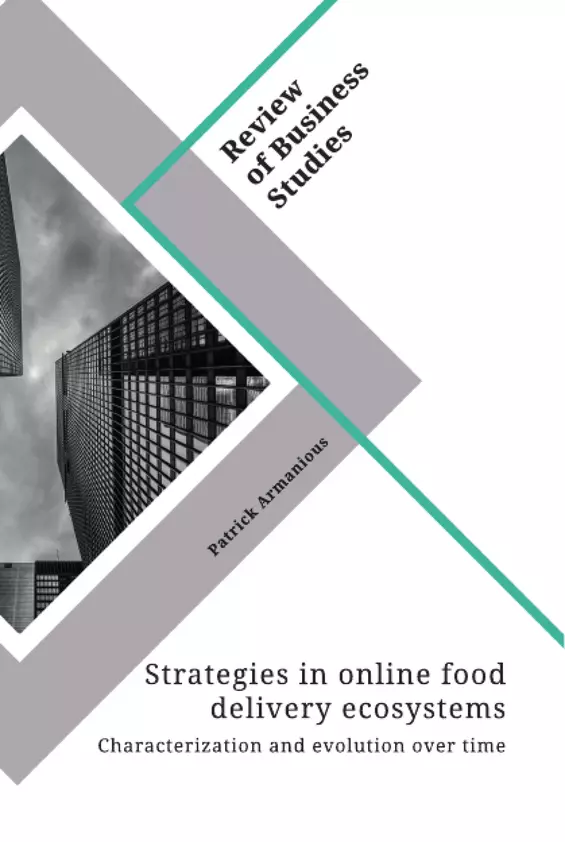The aim of this paper is to complement existing research on dynamic ecosystem strategies in the context of platforms. Two research questions will be answered: 1) How do competitive strategies of rival platform-based ecosystems evolve over time? 2) How can competitive strategies of rival platform-based ecosystems be characterized?
A longitudinal, multiple-case study has been conducted. This multiple-case study is pursuing an inductive, theory-building approach as there is limited theoretical foundation on strategies in platform-based ecosystems. Five online food delivery ecosystems in the German market are analyzed.
The business ecosystem perspective provides a holistic view on the interdependence across organizations. Yet, existing literature reveals little theoretical foundation with respect to ecosystem strategies in the context of platforms. Prior research includes a static view on ecosystem strategies leading to characterizations such as the “component” or “system” strategy.
Recently, a newly presented strategy, the bottleneck strategy, provides a dynamic view on ecosystem strategies. Unfortunately, much literature exclusively study cooperation and competition between ecosystem partners, however, neglects to explain how and why cooperation and competition between rival ecosystems generally occurs.
Inhaltsverzeichnis (Table of Contents)
- Introduction
- Theoretical background
- Existing research streams on the interdependence across organizations
- Ecosystem research stream
- Definition and characteristics of ecosystems
- Types of ecosystems
- Characteristics of platform-based ecosystems
- Value creation and value capture in ecosystems
- Ecosystem strategies
- Research questions
- Conceptual framework
- Application of developed conceptual framework
- Case context
- Research methodology of multiple-case study
- Case selection
- Data collection
- Data analysis
- Empirical results
- Launch strategy
- Pizza.de
- Lieferando
- Lieferheld
- Foodora
- Deliveroo
- Summary launch strategy
- 2007-2010: The lone rider
- 2011-2014: The arena fills up
- 2015-2018: The time for delivery logistics
- 2019-today: The chained monopolist
- Launch strategy
- Discussion
- Final evaluation
- Review of conceptual framework
- Review of empirical taxonomic framework
- Answering the research questions
- Managerial implications
- Limitations
- Further research
- Final evaluation
Zielsetzung und Themenschwerpunkte (Objectives and Key Themes)
The objective of this thesis is to expand upon existing research on dynamic ecosystem strategies within the context of platform-based online food delivery ecosystems. This research aims to answer two key questions: 1) How do competitive strategies of rival platform-based ecosystems evolve over time? 2) How can competitive strategies of rival platform-based ecosystems be characterized?
- Dynamic ecosystem strategies in platform-based ecosystems
- Evolution of competitive strategies in online food delivery ecosystems
- Characterizing competitive strategies of rival platform-based ecosystems
- Conceptual framework for analyzing ecosystem strategies
- Empirical case study of online food delivery ecosystems in Germany
Zusammenfassung der Kapitel (Chapter Summaries)
The thesis begins by providing a theoretical background, exploring existing research streams on the interdependence across organizations, particularly focusing on the ecosystem research stream. The research then outlines the definition and characteristics of ecosystems, specifically focusing on platform-based ecosystems. Key concepts such as value creation and value capture are discussed, followed by an exploration of ecosystem strategies. The thesis then details the research questions before introducing a conceptual framework for analyzing ecosystem strategies. The paper then applies this framework to an empirical case study of online food delivery ecosystems in the German market. The empirical results are presented across different phases of development, encompassing the initial launch strategy, the "lone rider" phase, the "arena fills up" phase, the "time for delivery logistics" phase, and the "chained monopolist" phase. Each phase highlights the evolution of competition and cooperation between rival ecosystems and ecosystem partners. The paper concludes by discussing the final evaluation of the conceptual and empirical frameworks, answering the research questions, outlining managerial implications, acknowledging limitations, and proposing avenues for future research.
Schlüsselwörter (Keywords)
The main keywords and focus topics of this research include platform-based ecosystems, online food delivery, competitive strategies, ecosystem strategies, platform competition, value creation and capture, theoretical framework, empirical case study, longitudinal analysis, and multiple-case study. The study also examines concepts such as the "bottleneck strategy," "component strategy," and "system strategy" in the context of platform-based ecosystems.
Frequently Asked Questions
What are the main research questions of this study?
The study asks: 1) How do competitive strategies of rival platform-based ecosystems evolve over time? 2) How can these competitive strategies be characterized?
What is a "bottleneck strategy" in an ecosystem?
It is a dynamic strategy that focuses on identifying and controlling critical points within the ecosystem to capture value and manage competition.
Which online food delivery services were analyzed?
The analysis includes Pizza.de, Lieferando, Lieferheld, Foodora, and Deliveroo within the German market.
How did the German market evolve from 2007 to today?
The market moved from "lone riders" to an increasingly crowded arena, then to a focus on delivery logistics, and finally to a state described as the "chained monopolist."
What is the "business ecosystem perspective"?
It provides a holistic view of the interdependence across different organizations, moving beyond simple competition to look at how platforms and partners create and capture value together.
- Arbeit zitieren
- Patrick Armanious (Autor:in), 2020, Strategies in online food delivery ecosystems. Characterization and evolution over time, München, GRIN Verlag, https://www.grin.com/document/1128804



